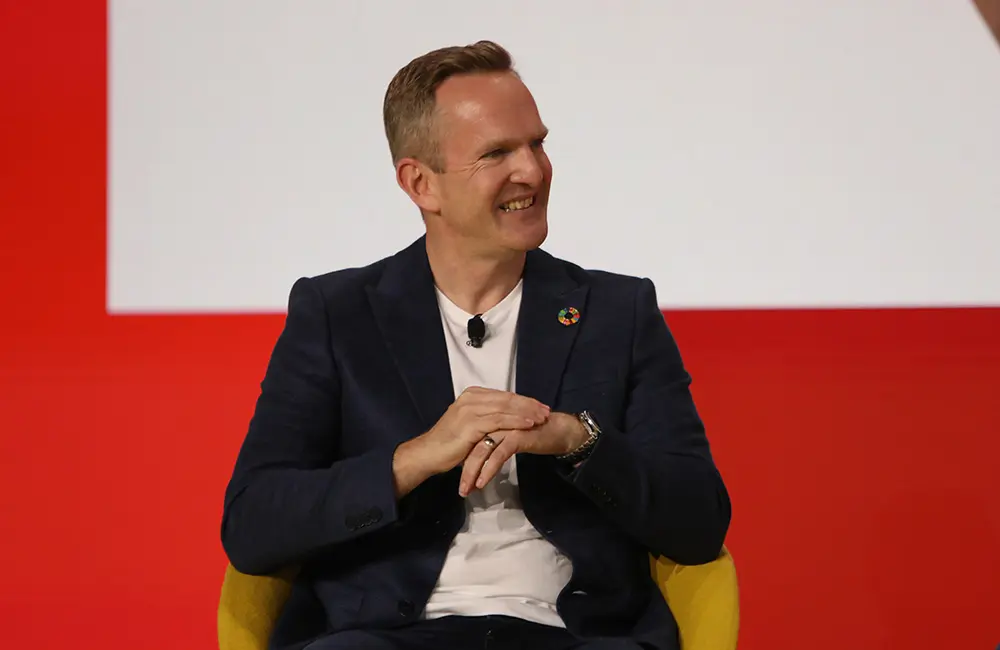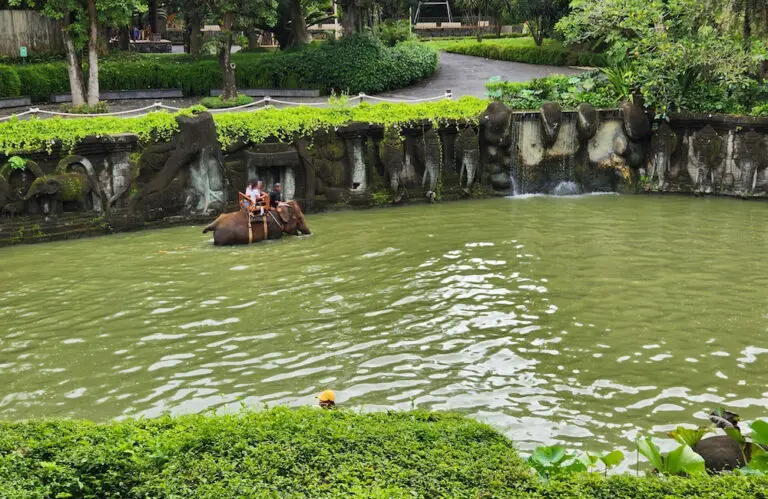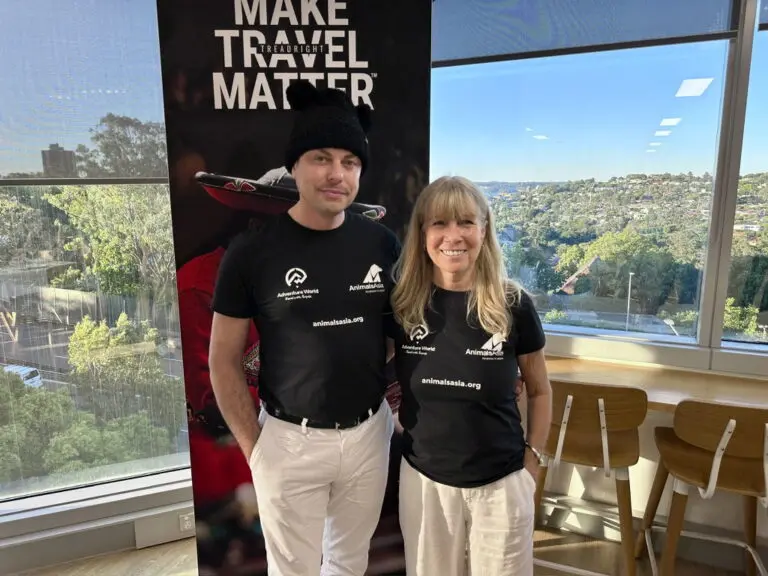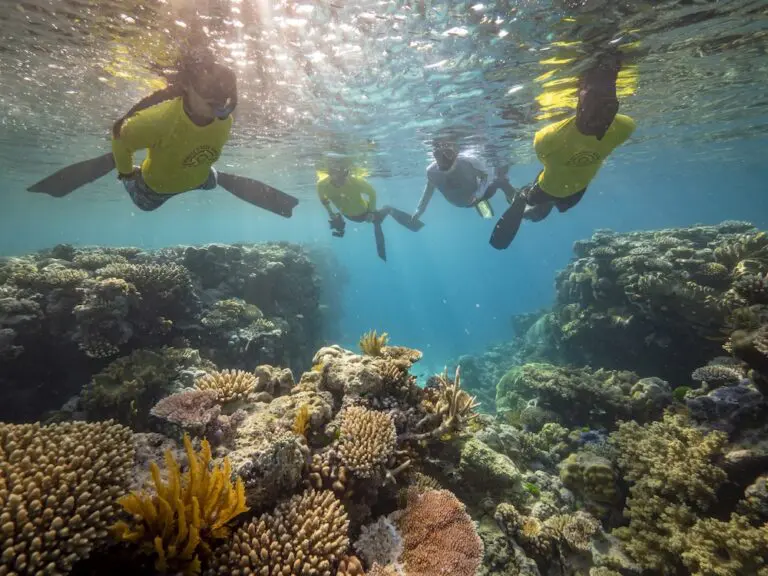Intrepid Travel started 35 years ago as a small, privately owned Australian adventure travel company that took Aussies to Southeast Asia. Today, it’s the world’s largest B-Corp travel brand, was recognised by TIME as one of its 100 Most Influential Companies in 2023 and has just launched its biggest-ever advertising campaign to the tune of AU$5 million. Karryon founder Matt Leedham caught up with CEO James Thornton in New York to find out more.
It’s the day before the Skift Global Forum kicks off in New York, where Thornton will be speaking on stage. We’re sitting outside a bar in the vibrant heart of trendy SoHo on the corner of where Little Italy begins. Across from us, the Feast and Festival of San Gennaro is in full swing. The annual celebration, an ode to Italian food, culture, and the joy of life’s simple but essential rituals, fittingly carries a theme of passing down traditions—a sentiment that has resonated with Intrepid Travel’s purpose-driven ethos since its inception in 1989.
Just a short distance away, billboards outside the iconic Madison Square Garden showcase Intrepid’s biggest-ever Only Intrepid campaign, including ads across the New York Subway. As the longstanding CEO of Intrepid Travel, this is a proud moment for Thornton, made even more special by his upcoming opportunity to speak at the Skift Global Forum tomorrow and share more of the company’s journey.
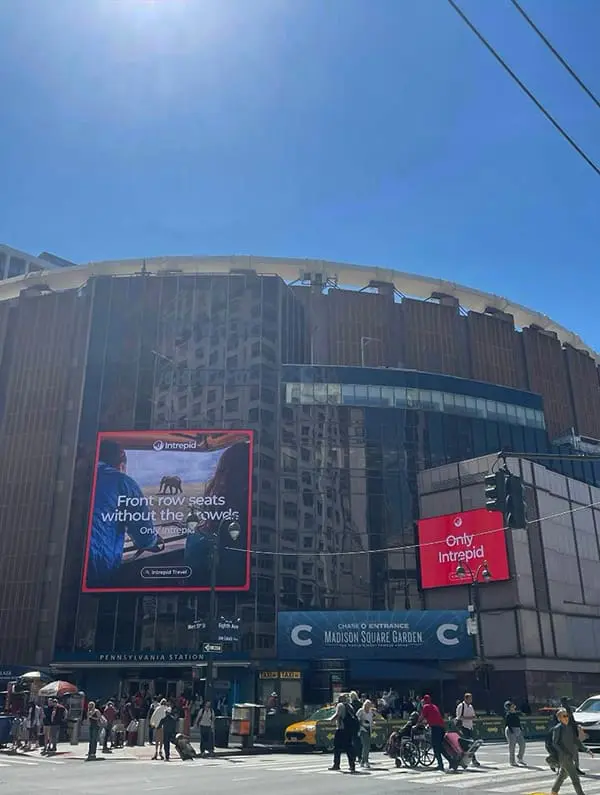
Gazing out at the kaleidoscope of colour and diversity passing us by on the paved streets of Soho, Thornton reflects, “We’ve come a long way from a small, privately-owned Australian adventure travel company that used to take Aussies to Southeast Asia. Now, we’re in one of the biggest cities in the world, and seeing the Intrepid brand in such an iconic location is fantastic.”
“It’s beyond my wildest dreams and certainly beyond the wildest dreams of our co-founders.”
“Still, to this day, though, I think our style of travel is something people don’t quite understand. They’d love to do it, but there are preconceived notions. This campaign is all about drawing out those incredible experiences in amazing parts of the world and celebrating the joys of being with Intrepid,” says Thornton.
This is a very brand-led campaign. What’s the thinking behind it?
“The thinking has been evolving. Leading up to the pandemic, many of the ways we went to market were digitally-led, but it became clear that Google was becoming increasingly competitive. And I don’t mean with other tour operators—Google itself is becoming the competition. We recognised that we needed to pivot more aggressively into brand commerce.
“Coming out of the pandemic, in the middle of 2022, just as travel was coming back, we took a big, bold bet with our Back for Good campaign. We revamped the Intrepid brand, tested it on the London Transport network, and saw inquiry metrics go through the roof. That gave us the confidence to expand to our other core markets. Soon, we had brand ads in Dundas Square in Toronto in Toronto and across transport networks in Sydney, Melbourne, Brisbane, and Auckland—it worked really well.
“We smashed all our metrics—revenue, profit, customer engagement, and people engagement. A lot of that success is due to the brand campaign and activations. Today, about 50% of what we spend when we go to market is on brand over paid advertising. I think that’s important, especially for a travel style that people are still getting familiar with.”
Tell us about the new Real Deal Australian product launch with 65 domestic trips and 41 First Nations experiences.
“It’s linked to a couple of things at Intrepid. One is that we’re increasingly focusing on “closer to home” travel. The climate crisis is upon us, and we realised during the pandemic that sometimes you can’t travel far for various reasons. In the future, it might be tougher to just jump on a plane. So, we’re capturing more domestic travel experiences. Australia is a big, beautiful country, and expanding our domestic range is essential.
“Second, our commitment to sustainability, diversity, equity, and inclusion drives us to work more closely with First Nations communities. We’ve embedded First Nations experiences in our trips, and customers who go on these trips are starting to learn more about the culture, language, history, and food. It’s a great point of differentiation that also connects people to the unique spirit of First Nations communities.”
Is inbound tourism to Australia also a big focus of this launch?
“Absolutely. We always talk about Intrepid in terms of inbound, outbound, and domestic travel. Brett Mitchell’s (Managing Director – Australia & New Zealand at Intrepid Travel) leadership focuses on taking Aussies to visit the 100+ international destinations we operate in. But increasingly, we’re looking at domestic travel and the inbound opportunity for visitors coming into Australia. I was just at Penn Station (in New York) the other day and saw our ads there alongside Northern Territory Tourism ads. Australia is making a concerted effort to attract visitors, and Intrepid is well-positioned to benefit from that inbound market.”
Let’s talk about overtourism. Can you share why your latest Not Hot List is so vital to Intrepid?
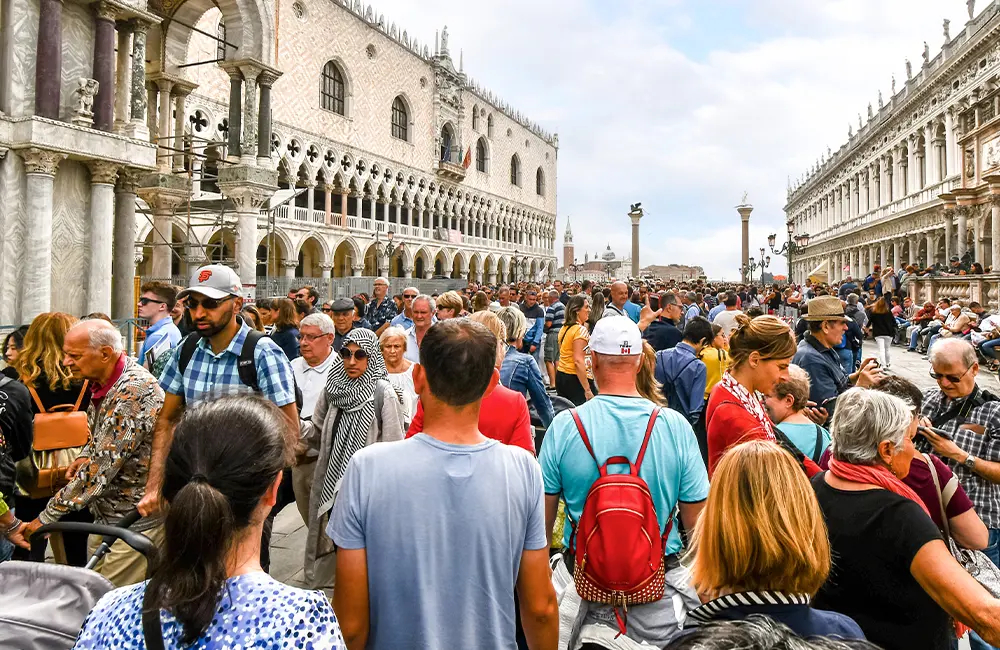
“Overtourism has been in the news increasingly, especially this summer, with some pretty nasty incidents in places like Barcelona. Travel has the power to do a lot of good, but it feels like 90% of travellers are going to just 10% of locations. I’ve spent time in Europe recently, and honestly, it hasn’t been fantastic—hot, crowded, expensive. There’s so much beauty and wonder in the world beyond those core destinations.
“We’ve been publishing the Not Hot list for about seven years now, and we’re trying to highlight the emerging destinations that people might not think of. We’ve got some great places on this year’s list—Scandinavia, Norway and Greenland. Greenland, with its new international airport, is going to be exciting. Iceland was massive five or six years ago, and Greenland could be next. Then we’ve got Uruguay with its wine regions, Mongolia, and even Pakistan. Our VP of Comms just came back from a trip there, and it’s amazing. Only 20,000 people go trekking in Pakistan compared to 2 million in Nepal, but the experience and the food are incredible. We want people to think beyond the prominent destinations.”
As we enter the next era of travel, what trends are you seeing?
“I think we’re lucky that people increasingly want experiences over material things. They want to do great things, and we’re living in an experience economy. People are also becoming more aware of sustainability, and they want to buy from or work for companies with true sustainability credentials. Intrepid is well-positioned for that.
“In many ways, it feels like we’re a 35-year-old overnight success. We’ve gone from being niche—adventure travel, experiential travel, sustainable travel—to now being at the forefront. When we first hired a Responsible Travel Manager in 1999, people thought we were crazy. Now, here we are, sharing the stage with industry leaders like Brian Chesky at Skift. Intrepid will grow over 20% this year compared to last year, which was our biggest year ever.
“Our annual integrated report, which will show our revenues, profits, NPS, customer numbers, and purpose-driven activities, will be released in March. Thanks to the amazing people at Intrepid and global trends toward experiences and sustainability, it’s going to be another record year.”
Are you seeing a lot of new customers coming through?
“Definitely. We have a 25% repeat rate, but even our most loyal customers only travel with us once every 700 days. So, we’re always focused on acquisition. That’s why you see our brand advertising everywhere. We need to keep bringing new people into the funnel, and it’s working. More people seem to be searching and looking for a truly small group adventure. They want to get away from those larger group experiences and into something more intimate. Our NPS (Net Promoter Score) is pretty strong, and people tend to stick around and keep coming back once they’ve experienced it.
“You think of Intrepid—we’re a household name in Australia, which is great. But in the U.S., it’s a different story. The population here is about 350 million people, and the addressable market for us is probably around 25 million. But when people hear the name “Intrepid,” they often think of the warship on the Hudson River. So, there’s a significant opportunity here in the U.S., which is why we’re spending more time in this market.”
It feels like the word ‘sustainability’ has become one that evokes some eye-rolling when it’s mentioned now. What’s your take on where things are at?
“I think people are more wary, but I also think companies that do it well, like Intrepid, are really well-placed to succeed. When you look at the travel industry, I think it roughly splits into thirds. One-third of companies are doing really great things—taking action, measuring their impact, offsetting their emissions, and genuinely making a difference. Intrepid is one of them, but there are many others.
“About a third want to take action but aren’t sure how to go about it. It’s like AI—people know about it, but they don’t know how to start using it. Intrepid is trying to educate those companies. We’ve made guides for climate action and animal welfare that are available on our website as open-source tools. We want others to use them and take action, too.
“Unfortunately, a third of companies are still burying their heads in the sand and hoping this all goes away. But in Europe, we’re already seeing legislation catch up with those companies, and it’s only a matter of time before the same happens elsewhere. Venice has already banned tour groups of more than 25 people, and I think more regulations are coming.
“For customers, it’s confusing. They want independent certification and verification, and that’s where B Corp comes in. It’s a movement of about 8,500 companies now trying to balance stakeholder interests. But sustainability isn’t black and white. Intrepid isn’t perfect, and just because you don’t have a B Corp certification doesn’t mean you’re not doing great things. It’s all about making incremental improvements and learning from mistakes. If we don’t, legislators will step in and do it for us, and that will be a real challenge for the travel industry.”
You recently created an Agent of Change Guide to educate travel advisors. How have your agent partners received it?

“Yvette Thompson (General Manager – Sales & Marketing ANZ at Intrepid Travel) and her team have done an incredible job engaging our travel agent partners. It’s not just about adventure travel or sustainable travel—it’s about sharing that knowledge and making sure agents understand the value of these experiences. Our mission is to create positive change through the joy of travel. It’s important to remember that we’re not just serving one stakeholder—the customer—we’re also serving local communities, the environment, and our partners. Sometimes, those interests conflict, but we work hard to navigate those challenges and make the right decisions.
“The Agent of Change Guide has been a great tool in spreading that message, and I’m proud of the work Yvette and the team have done. We’ve been proactive in sharing knowledge with the industry, and it’s critical that we continue to do that. If we don’t share our expertise and lead the way, the legislation will hit all of us, and we’ll all face the same challenges.
“If we don’t share and educate others, then when the regulations come, we’ll all be affected. It’s like riding a bike—you’re not going to be perfect at it from day one, but you’ve got to keep making progress and improving.”
What’s next for you personally?
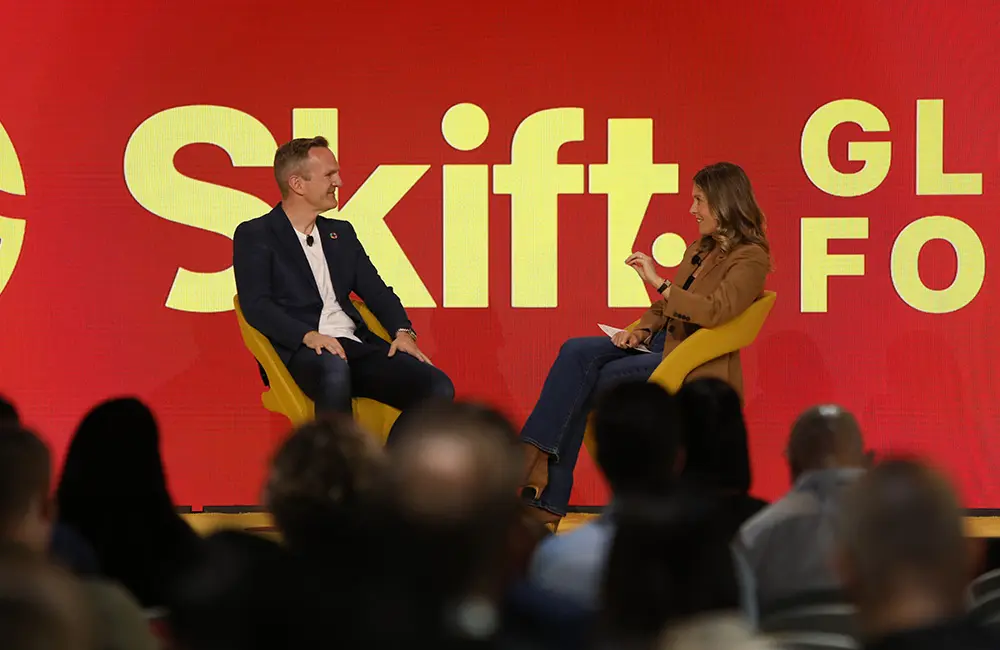
“I’m excited to be here in New York City to speak at Skift tomorrow. It feels like the centre of everything, and I’m incredibly proud that a small, privately-owned Australian adventure travel company is now on the global stage. Intrepid has become an international success story, and that’s something Australia should be proud of.
“Being up there with companies like Airbnb, Expedia, Booking, Marriott, and Hilton is pretty cool. We’re going to be talking about balancing purpose and profits—showing that you can be fiscally conservative but also socially progressive, and one doesn’t have to come at the expense of the other.”
The Skift Global Forum returned to New York City for its eleventh year and ran from 17 to 19 September 2024. Since its inception, the forum has been instrumental in shaping the future of the travel industry. In 2024, the global theme was Travel’s Great Renewal (and Reckoning), addressing the industry’s path forward amid economic uncertainties, political challenges, climate change, rapid technological shifts, and evolving traveller expectations. Matt Leedham attended as a guest of Skift.
For more details about the event, head to live.skift.com/skift-global-forum/


